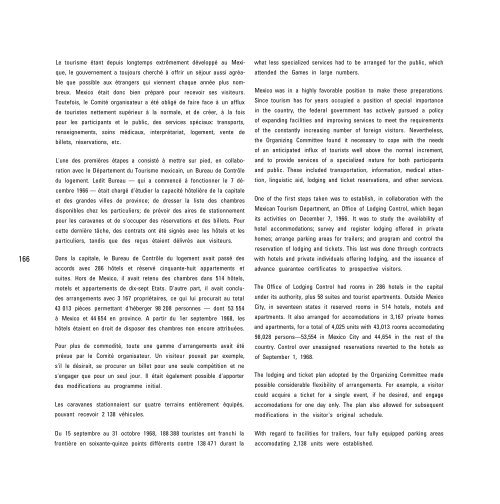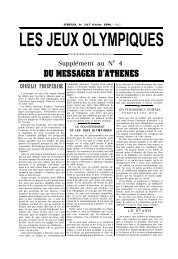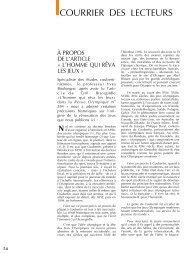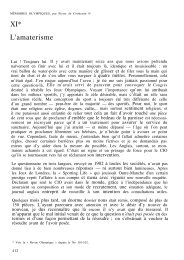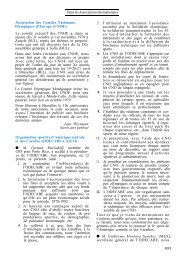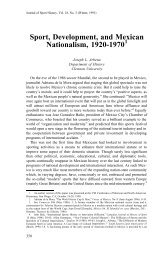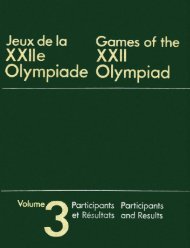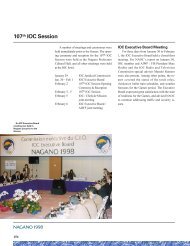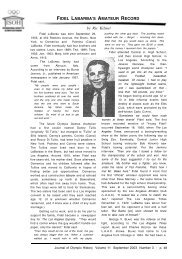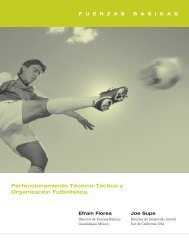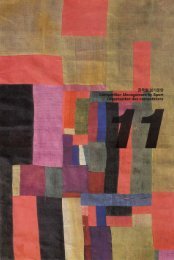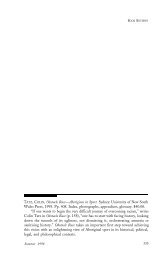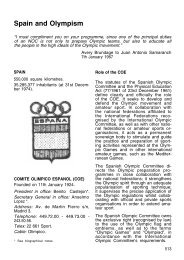Mexico City Olympic Games Official Report ... - LA84 Foundation
Mexico City Olympic Games Official Report ... - LA84 Foundation
Mexico City Olympic Games Official Report ... - LA84 Foundation
You also want an ePaper? Increase the reach of your titles
YUMPU automatically turns print PDFs into web optimized ePapers that Google loves.
166<br />
Le tourisme étant depuis longtemps extrêmement développé au Mexi-<br />
que, le gouvernement a toujours cherché à offrir un séjour aussi agréa-<br />
ble que possible aux étrangers qui viennent chaque année plus nom-<br />
breux. <strong>Mexico</strong> était donc bien préparé pour recevoir ses visiteurs.<br />
Toutefois, le Comité organisateur a été obligé de faire face à un afflux<br />
de touristes nettement supérieur à la normale, et de créer, à la fois<br />
pour les participants et le public, des services spéciaux: transports,<br />
renseignements, soins médicaux, interprétariat, logement, vente de<br />
billets, réservations, etc.<br />
L'une des premières étapes a consisté à mettre sur pied, en collabo-<br />
ration avec le Département du Tourisme mexicain, un Bureau de Contrôle<br />
du logement. Ledit Bureau — qui a commencé à fonctionner le 7 dé-<br />
cembre 1966 — était chargé d'étudier la capacité hôtelière de la capitale<br />
et des grandes villes de province; de dresser la liste des chambres<br />
disponibles chez les particuliers; de prévoir des aires de stationnement<br />
pour les caravanes et de s'occuper des réservations et des billets. Pour<br />
cette dernière tâche, des contrats ont été signés avec les hôtels et les<br />
particuliers, tandis que des reçus étaient délivrés aux visiteurs.<br />
Dans la capitale, le Bureau de Contrôle du logement avait passé des<br />
accords avec 286 hôtels et réservé cinquante-huit appartements et<br />
suites. Hors de <strong>Mexico</strong>, il avait retenu des chambres dans 514 hôtels,<br />
motels et appartements de dix-sept Etats. D'autre part, il avait conclu-<br />
des arrangements avec 3 167 propriétaires, ce qui lui procurait au total<br />
43 013 pièces permettant d'héberger 98 208 personnes — dont 53 554<br />
à <strong>Mexico</strong> et 44 654 en province. A partir du 1er septembre 1968, les<br />
hôtels étaient en droit de disposer des chambres non encore attribuées.<br />
Pour plus de commodité, toute une gamme d'arrangements avait été<br />
prévue par le Comité organisateur. Un visiteur pouvait par exemple,<br />
s'il le désirait, se procurer un billet pour une seule compétition et ne<br />
s'engager que pour un seul jour. Il était également possible d'apporter<br />
des modifications au programme initial.<br />
Les caravanes stationnaient sur quatre terrains entièrement équipés,<br />
pouvant recevoir 2 138 véhicules.<br />
Du 15 septembre au 31 octobre 1968, 188 388 touristes ont franchi la<br />
frontière en soixante-quinze points différents contre 138 471 durant la<br />
what less specialized services had to be arranged for the public, which<br />
attended the <strong>Games</strong> in large numbers.<br />
<strong>Mexico</strong> was in a highly favorable position to make these preparations.<br />
Since tourism has for years occupied a position of special importance<br />
in the country, the federal government has actively pursued a policy<br />
of expanding facilities and improving services to meet the requirements<br />
of the constantly increasing number of foreign visitors. Nevertheless,<br />
the Organizing Committee found it necessary to cope with the needs<br />
of an anticipated influx of tourists well above the normal increment,<br />
and to provide services of a specialized nature for both participants<br />
and public. These included transportation, information, medical atten-<br />
tion, linguistic aid, lodging and ticket reservations, and other services.<br />
One of the first steps taken was to establish, in collaboration with the<br />
Mexican Tourism Department, an Office of Lodging Control, which began<br />
its activities on December 7, 1966. It was to study the availability of<br />
hotel accommodations; survey and register lodging offered in private<br />
homes; arrange parking areas for trailers; and program and control the<br />
reservation of lodging and tickets. This last was done through contracts<br />
with hotels and private individuals offering lodging, and the issuance of<br />
advance guarantee certificates to prospective visitors.<br />
The Office of Lodging Control had rooms in 286 hotels in the capital<br />
under its authority, plus 58 suites and tourist apartments. Outside <strong>Mexico</strong><br />
<strong>City</strong>, in seventeen states it reserved rooms in 514 hotels, motels and<br />
apartments. It also arranged for accomodations in 3,167 private homes<br />
and apartments, for a total of 4,025 units with 43,013 rooms accomodating<br />
98,028 persons—53,554 in <strong>Mexico</strong> <strong>City</strong> and 44,654 in the rest of the<br />
country. Control over unassigned reservations reverted to the hotels as<br />
of September 1, 1968.<br />
The lodging and ticket plan adopted by the Organizing Committee made<br />
possible considerable flexibility of arrangements. For example, a visitor<br />
could acquire a ticket for a single event, if he desired, and engage<br />
accomodations for one day only. The plan also allowed for subsequent<br />
modifications in the visitor's original schedule.<br />
With regard to facilities for trailers, four fully equipped parking areas<br />
accomodating 2,138 units were established.


